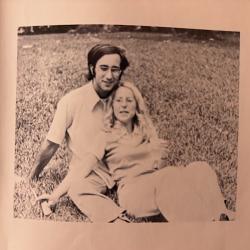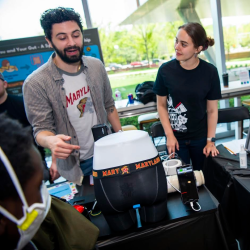Senior Lecturer Patricia Shields Receives International Microbiology Teaching Award
Shields honored for creative teaching, student mentorship and encouraging educators
Patricia Shields, a senior lecturer in the Department of Cell Biology and Molecular Genetics at the University of Maryland, received the 2017 Carski Foundation Distinguished Undergraduate Teaching Award. The American Society of Microbiology—the oldest and largest life sciences professional organization in the world—bestows this award upon educators in recognition of “outstanding teaching of microbiology to undergraduate students and for encouraging them to subsequent achievement.”
 Shields, who grew up close to College Park in nearby Adelphi, Maryland, earned her doctorate in microbiology from the University of Florida in 1985. After graduation, she worked at the U.S. Food and Drug Administration and the National Institutes of Health before leaving the federal sector for a private biotechnology company. But Shields realized that she missed teaching, so she began to teach part time at Trinity College in the District of Columbia and quickly received an offer to teach full time and leave behind her lucrative research position—which she did.
Shields, who grew up close to College Park in nearby Adelphi, Maryland, earned her doctorate in microbiology from the University of Florida in 1985. After graduation, she worked at the U.S. Food and Drug Administration and the National Institutes of Health before leaving the federal sector for a private biotechnology company. But Shields realized that she missed teaching, so she began to teach part time at Trinity College in the District of Columbia and quickly received an offer to teach full time and leave behind her lucrative research position—which she did.
“It was the best decision I ever made,” Shields said.
Shields taught at Trinity College from 1994 to 1997 and at George Mason University from 1997 to 2000 before joining the University of Maryland as a lecturer in 2001. She currently teaches BSCI 348P: General Biology Teaching Practicum, which focuses on undergraduate science education, and BSCI 170: Principles of Molecular and Cellular Biology, an introductory course that clocks in at 670 students this spring for the active learning sections.
In 2009, Shields began to offer an optional “bonus” section for BSCI 170 (then called BSCI 105). This section featured interactive discussions and demonstrations, and proved so popular that Shields decided to adapt and expand the activities to the entire class. In 2014, with funding from the university’s Elevate Fellows program, Shields redesigned BSCI 170 into a more interactive, engaging and student-led format that launched in spring 2015.
“The most effective way to learn is if one student shows or teaches another student,” said Shields. “And the second most effective way to learn is if a student actively engages in the material.”
To that end, Shields employs an “army” of undergraduate learning assistants (ULAs) who help lead her class in hands-on activities. For instance, when students learn about cellular membranes, they create their own models out of pipe cleaners and clay.
Similarly, Shields created an interactive kit to teach polymerase chain reaction (PCR), a molecular biology technique that massively amplifies DNA regions of interest. PCR’s applications range from crime scene investigations to drafting the Neanderthal genome. These PCR teaching kits contain color-coded DNA pieces made out of pipe cleaners and students assemble the different pieces to simulate the steps of PCR.
 “PCR is a really hard concept for students to see,” Shields said. “How do you start with a long piece of DNA and end up with short pieces of DNA? By performing all the steps of PCR themselves, students can visualize and come to understand the process.”
“PCR is a really hard concept for students to see,” Shields said. “How do you start with a long piece of DNA and end up with short pieces of DNA? By performing all the steps of PCR themselves, students can visualize and come to understand the process.”
For BSCI 222: Principles of Genetics, a class she taught previously, Shield created demonstrations to bring abstract concepts into the classroom.
Shields’ peers recognize her dedication and passion for teaching. Prior to the Carski Award, Shields received many other teaching awards, including a Faculty Excellence Award for Teaching and Course Development in 2007 from the College of Chemical and Life Sciences (now the College of Computer, Mathematical, and Natural Sciences (CMNS)), an Outstanding Lecturer Award from CMNS in 2013 and a Donna B. Hamilton Teaching Award for Excellence in Undergraduate Education from the Office of Undergraduate Studies in 2015.
In addition, two Merrill Presidential Scholars—one in 2015 and one in 2016—chose Shields as their faculty mentor. The Merrill program recognizes UMD’s most successful seniors and their designated university faculty and K-12 teachers for their mentorship.
“I think what's most apparent about Dr. Shields and her teaching style is how much she cares about her students and how much she wants her students to understand the material,” said Vered Schwell, a biological sciences major and 2016 Merrill Presidential Scholar. “She really pushes you to delve deeper into the material and make connections you may have otherwise missed.”
For some students, Shields’ influence continues long after class ends.
“Patty is unparalleled in her ability to provide mentorship to students, whether it be in a personal, academic or professional sense,” said alumnus Jeffrey Olimpo (M.S. ’09, Ph.D. ’13, education, curriculum and instruction). “As a result of working with Patty, I decided to pursue my Ph.D. at UMD, and I am now an assistant professor in the Department of Biological Sciences at The University of Texas at El Paso, with a focus on bioeducation research. Patty has been, unequivocally, one of the most influential factors in promoting my interest in this area and in my successes to date.”
 Shields deserves the Carski and other teaching awards, according to Erica Suchman, who is associate department head for undergraduate education in the Department of Microbiology, Immunology & Pathology at Colorado State University. Suchman nominated Shields for the Carski Award for “training future generations of teachers in how to improve biology education, encouraging University of Maryland faculty through multiple committees dealing with student achievement and encouraging educators everywhere by sharing the pedagogies she has developed.”
Shields deserves the Carski and other teaching awards, according to Erica Suchman, who is associate department head for undergraduate education in the Department of Microbiology, Immunology & Pathology at Colorado State University. Suchman nominated Shields for the Carski Award for “training future generations of teachers in how to improve biology education, encouraging University of Maryland faculty through multiple committees dealing with student achievement and encouraging educators everywhere by sharing the pedagogies she has developed.”
Robert Infantino, associate dean for undergraduate education for the College of Computer, Mathematical, and Natural Sciences, agrees.
“Patty is an exemplary leader in undergraduate education,” said Infantino. “She has taught more than 10,000 students at the University of Maryland and advised thousands. She is consistently evaluated as well above college averages, for both being intellectually challenging and because students learn a lot in her courses.”
Upon reflection, Shields acknowledged she has always worked extremely hard on her teaching and her research, but she didn’t do it alone. She highlighted the contributions of Infantino and Michael Keller, her co-instructor for BSCI 170 and a lecturer in the Department of Cell Biology and Molecular Genetics.
“I am lucky to work with some of the best people. None of this would have happened without the support of the college and my colleagues,” Shields said.
###
Media Relations Contact: Irene Ying, 301-405-5204, zying@umd.edu
University of Maryland
College of Computer, Mathematical, and Natural Sciences
2300 Symons HallCollege Park, MD 20742
www.cmns.umd.edu
@UMDscience
About the College of Computer, Mathematical, and Natural Sciences
The College of Computer, Mathematical, and Natural Sciences at the University of Maryland educates more than 7,000 future scientific leaders in its undergraduate and graduate programs each year. The college’s 10 departments and more than a dozen interdisciplinary research centers foster scientific discovery with annual sponsored research funding exceeding $150 million.







